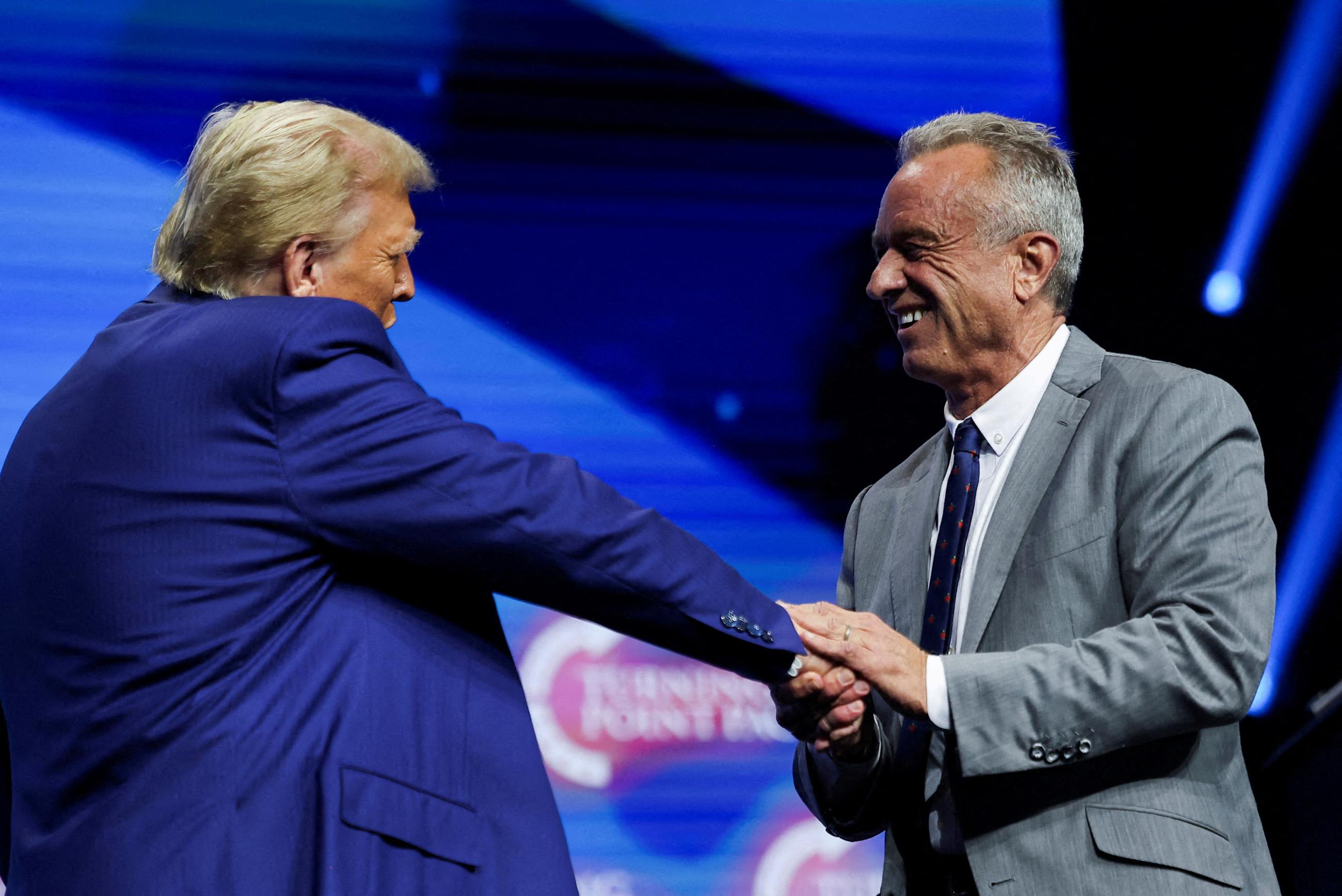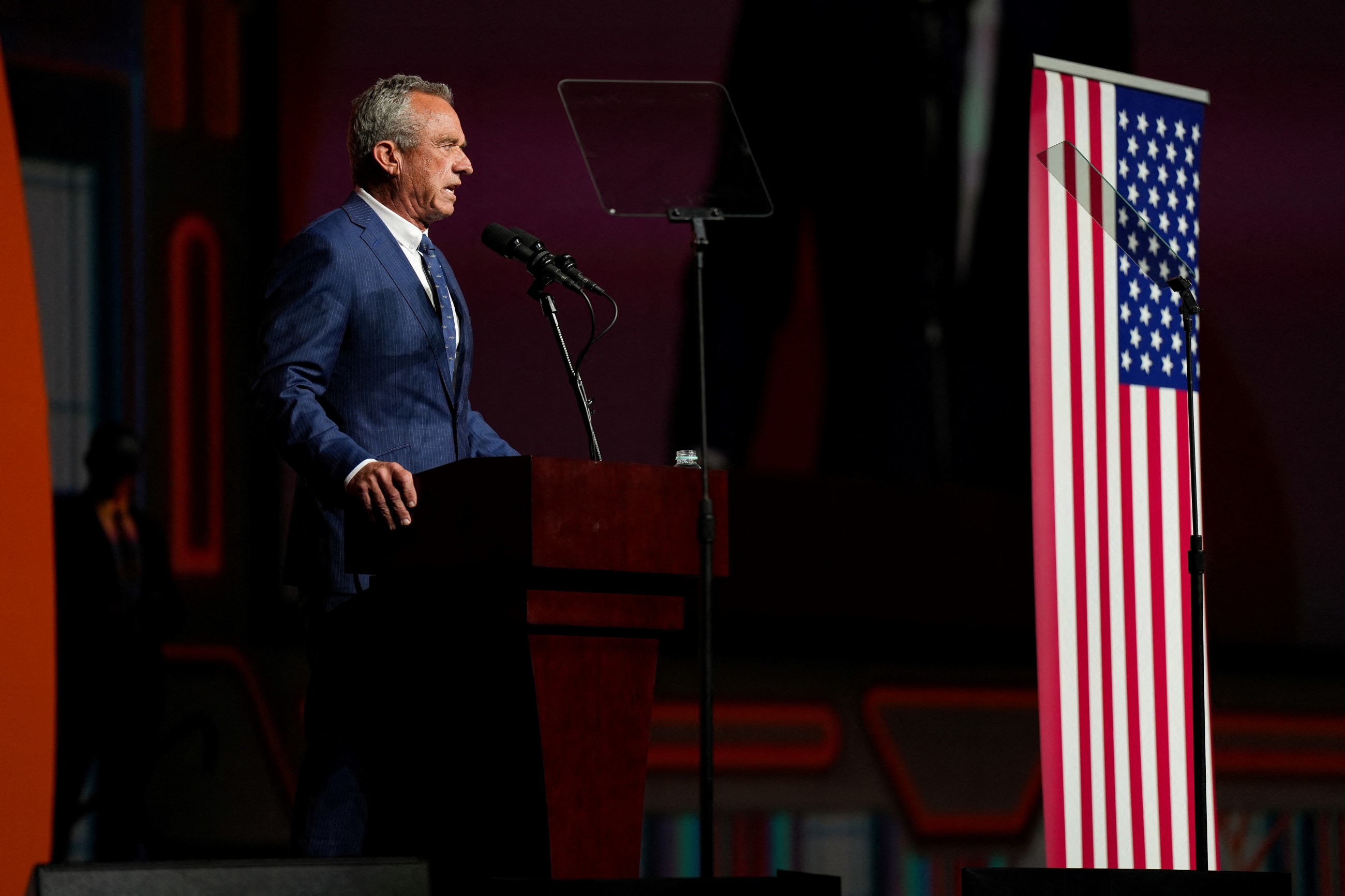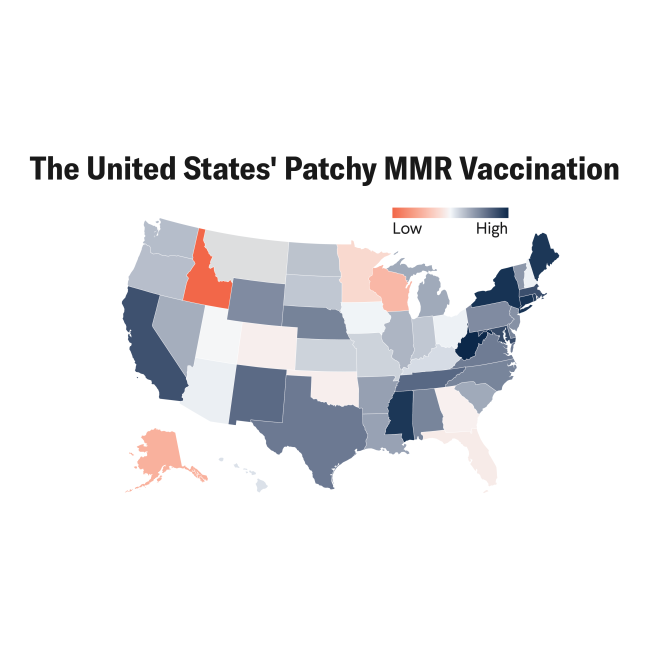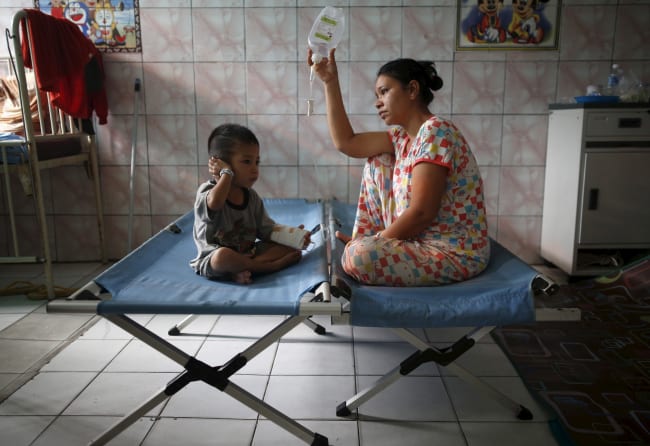Last week, President-elect Donald Trump sent shockwaves through the public health sphere when he nominated Robert F. Kennedy Jr. to become the secretary of the U.S. Department of Health & Human Services (HHS).
Kennedy, who rose to prominence as an environmental lawyer and anti-vaccine activist, has promised sweeping changes to the $2.5 trillion department, which employs 83,000 people and includes agencies such as the Centers for Disease Control and Prevention (CDC), Food and Drug Administration (FDA), and the National Institutes of Health (NIH).
Among his public statements are a suggestion to pause NIH research on drug development and infectious diseases for eight years and plans to cut FDA departments responsible for oversight on nutrition to address health concerns about processed foods.
He also says he would reverse the recommendation on adding fluoride supplements in drinking water, even though the practice improves dental health and an overwhelming majority of Americans—95%—are exposed to levels deemed safe by the World Health Organization. According to the Washington Post, Kennedy visited Samoa in June 2019 and spread anti-vaccine rhetoric, and the island nation subsequently experienced a measles outbreak that infected more than 5,700 people and killed 83, many of whom were young children.
To get a sense of what Kennedy could mean for U.S. vaccine policy, Think Global Health spoke with Paul Offit, director of the Vaccine Education Center at Children's Hospital of Philadelphia and a professor of pediatrics at the University of Pennsylvania School of Medicine. Offit, a frequent advisor for federal health agencies, discusses Kennedy's path to becoming an anti-vaccine advocate, how his potential appointment could affect children's health, and whether anything can be done to address the rising wave of vaccine doubt.
□ □ □ □ □ □ □ □ □ □ □ □ □ □ □
Think Global Health: What was your initial reaction to the Kennedy nomination?
Offit: Shock. We're living in a world that's turned upside down. The notion is that anyone can just declare their own truths, including scientific truths. Science is losing its place as a source of truth. This is a man who claims that HIV is not the cause of AIDS; that we should drink raw milk, ignoring the fact that pasteurization has allowed us to not contract diseases such as salmonella, campylobacter, E. coli; that vaccines cause autism, when clearly study after study has shown that they do not.
This is a man who claims that HIV is not the cause of AIDS
In July 2023, when asked the question of whether any vaccine is beneficial, he said, "there's no vaccine that's safe and effective." The podcaster who asked then followed up with, well, how about the polio vaccine?
It's a reasonable question, given that Kennedy was born a year before the polio vaccine was licensed and certainly knew what polio could do in this country. He knew that 20,000 to 30,000 children were paralyzed every year and 1,500 died on average, and yet he still said, no, that the vaccine killed more people than it saved.
He said that the SARS-CoV-2 coronavirus was essentially created in a laboratory, which isn't true. It started with an animal-to-human spillover event that occurred in the Huanan seafood wholesale market, as the Chinese government certainly knows. He said that the virus was designed to target Blacks and Whites, but spares Ashkenazi Jews and Chinese people, which is obviously nonsense.
He says these things—things that are profoundly untrue—and then he's offered a position to head a group of scientific agencies like the CDC, FDA, and NIH.
It's just a world turned upside down.
Think Global Health: The HHS secretary serves as a figurehead for health conversations, and HHS agencies are also responsible for setting vaccine policy goals. The CDC, for example, makes vaccine recommendations that dictate insurance coverage. Do you think he could pull this policy lever or others to limit vaccine access?
Offit: Yes, I do. He could do a lot of things. If the FDA chooses to license a drug or a vaccine, he could say, I don't think enough studies have been done. He could gut the drug advisory committees, whether it's FDA's Vaccines and Related Biological Products Advisory Committee (VRBPAC) or the CDC's Advisory Committee on Immunization Practices (ACIP).
He could make insurance much more difficult. He could say that I don't think certain vaccines should be part of the vaccine injury compensation program and turn them over to the slings and arrows of outrageous civil litigation, which almost drove vaccines out of existence in this country in the mid-1980s.
Kennedy would be an agent of chaos when it came to vaccines and the people who would suffer the most are children, because it's always the most vulnerable among us who suffer our ignorance.
Think Global Health: Could he pull back on vaccines that are already approved?
Offit: I don't know. I'm not sure. A lot of these things are not law.
Think Global Health: This week you resurfaced an article on your Substack about a conversation you had with Kennedy about 20 years ago about methylmercury and vaccine preservatives, a common source of discussion among the anti-vaccine community.
What do you think people should take away from that piece?
Offit: Well, this was his launch into the anti-vaccine world.
When he called me, he said that parents had come into his office and were concerned about a preservative found in some vaccines called thimerosol, which contains a compound called ethylmercury.
A concern about mercury is reasonable, but the fact of the matter is if you live on this planet, which we all do, you're all going to be exposed to naturally occurring mercury. And mercury at high concentrations can be harmful, no doubt about it, as evidenced by the Iraqi fumigated grain disaster and the Minamata Bay disaster, which were caused by industrial contaminations of a different compound called methylmercury. Those disasters affected the unborn and young children.
Now, methylmercury can accumulate in the body because it has a much longer half-life than the ethylmercury that was in vaccines. The question is, was the mercury in vaccines at a higher level?
At the time he and I spoke, around 2004, a lot of vaccine studies had been done and hadn't found connections to autism or neurologic conditions. Western Europe had taken thimerosal out of vaccines in the early 1990s, so you could compare before and after that moment. Studies were undertaken involving some Canadian provinces that had used vaccines that contained thimerosal that were right next to other provinces that used similar vaccines that didn't contain thimerosal. By around 2001, drugmakers had also essentially taken thimerosal out of vaccines given to young children.
I had a long conversation with him and went through those studies and he seemed perfectly satisfied. It was great. I remember coming home that night and telling my wife how I had a great conversation with Robert F. Kennedy's son. His father was someone I admired. It seemed like a perfectly pleasant conversation.
Think Global Health: What happened next?
Offit: Then, months later, in July 2005, in a Rolling Stone issue he just sandbagged me. He said I was just in the pocket of industry. That the only reason I said that thimerosal in vaccines wasn't harmful was because the vaccine that I was working on—the rotavirus vaccine that was recommended for licensure and then universal use a year later—was quote unquote laced with thimerosal, which wasn't true. No live attenuated viral vaccines contain preservatives.
The article had so many misstatements of fact that I called Rolling Stone and talked to the editor and said, "this is just wrong," and they eventually retracted the article after other people complained about its many misstatements to fact.
These themes ultimately carried forward with him, wherein he claims there's a massive conspiracy to hide the truth—that only he's going to get at the truth.
I became part of his stump speech when he would speak to groups. I just think he used me as a foil to launch his career as an anti-vaccine activist. It's all very disappointing; you're sort of a dupe. When he said that parents were worried and he was concerned, I took him at his word but was wrong to because he lied to me.
Think Global Health: Do you think the disinformation he spreads about vaccines is more advanced and sophisticated than the average? He seems to use his legal background to develop arguments about vaccines that come off as fact based and well researched, but are obviously filled with flaws and falsehoods.
Offit: Yes is the short answer. What he does that's different from most is he says, look, I am functionally a scientist, although trained as a lawyer. I always make sure I read the science. I always make sure I know the science as an environmental lawyer, given his background with Hudson Riverkeepers.
He alludes to scientific studies that don't say what he claims they say
If you listen to when he talks or does interviews, he always talks about the science. I'll give you a perfect example. With regard to thimerosal, he points to this paper by Thomas Burbacher, when researchers inoculated young monkeys with vaccines that contain thimerosal. They could in fact detect this ethylmercury within the brains, which is not surprising because it's organic mercury, just like the methylmercury that we ingest every day. But, as I said earlier, methylmercury has a much longer half-life.
In any case, Kennedy said the researchers found that ethylmercury caused a massive amount of inflammation. Well, that's not what the paper says. The paper says there wasn't inflammation with ethylmercury and that there were no clinical changes.
That's what Kennedy does. He assumes correctly that most people aren't going to go look at the paper and that they're going to trust him. He just lies at a higher level than most people because he alludes to scientific studies that don't say what he claims they say.
He's also, at least when he was with the Children's Health Defense, a paid advocate. He's a paid legal advocate for a particular position and that position is that no vaccine is of value. So he never backs down, and when data shows that he's wrong, he still doesn't back down.
Think Global Health: CDC data shows clearly that a growing group of people are opting out of childhood vaccines, despite the health benefits. What's missing from the conversation?
Offit: The CDC recently showed that about 3.3% of kindergartners and their parents are choosing nonmedical exemptions—philosophical or religious exemptions. That is the highest it's ever been. That exemption rate has exceeded 5% in 14 jurisdictions. The CDC states that the country is now at the point where people are below the levels required for herd immunity for some childhood infections.
So, this effect of choosing not to vaccinate your children now has the consequence of seeing more in the way of vaccine preventable diseases. Consistent with that, measles and whooping cough rates are going up. Last year, 200 children died of influenza, which is a very high number.
That Kennedy could actually be considered for this position is because there's distrust. The reason that we see this increase in vaccine exemption is because of distrust.
Think Global Health: What's driving this distrust?
I think it was the COVID-19 pandemic. I would have imagined the opposite would have been true because the vaccines are estimated to have saved 3 million American lives over the early years of the rollout, and about 230,000 or so people died because they chose not to get a vaccine. Vaccines were the hero in many ways of that pandemic, but they weren't perceived that way
The reason was one word: mandates
The reason was one word: mandates. Mandates really rub people the wrong way, not just vaccine mandates, but masking mandates, social distancing mandates, closing schools, shuttering businesses, restricting travel, isolating, and quarantining.
It led to this libertarian hook, which the Right has embraced. There never used to be a politics to anti-vaccine activity. On the Left, there was always the all-natural crowd—don't inject me with anything that has a chemical name. On the Right, it was this libertarian argument for getting the government off my back—don't tell me what to do.
But elected leaders and health officials did tell people what to do during the COVID pandemic. You couldn't go to your favorite bar, sporting event, restaurant, or place of worship unless you showed that vaccine card. It really rubbed people the wrong way.
That's what you're seeing now. The Right has embraced that. I don't think the Right is anti-vaccine so much as they are anti being told they have to get a vaccine.
Think Global Health: How do you repair that distrust?
Offit: It's a hard question to answer. If you look at somebody like Ala Stanford, I think she has the answer at some level. She is an African American surgeon who took it upon herself to form the Black Doctors COVID Consortium.
So she and a couple hundred doctors go into North Philadelphia, where she then sits down in people's homes, people who look like her, and gives them something they don't have—a doctor they can see. She talks to them about what their concerns are about the vaccine and if the conversation doesn't work and she can't convince them, she comes back again.
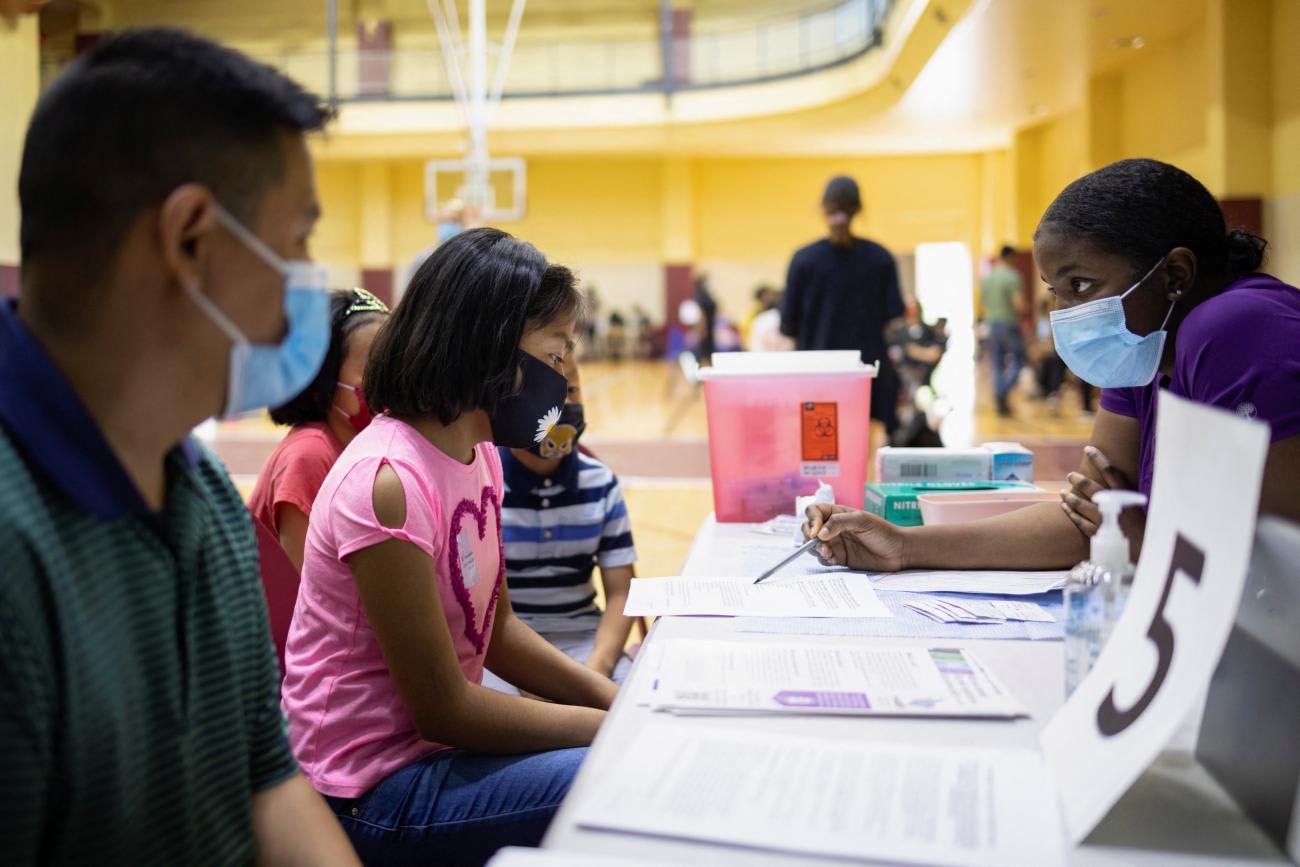
I think by listening to their concerns, by answering their concerns, and by showing how much she cares that her team convinced 50,000 people in North Philadelphia, a predominantly Black and brown community, to get vaccinated.
That's one of the points of light of this pandemic. We just needed thousands of more points of light like that. That's what it requires to gain trust. I think people generally trust their doctors and health care professionals.
Think Global Health: Do you see any benefits in the vaccine space or in general from Kennedy becoming the HHS secretary?
Offit: No, no. I'm all for the concepts on food—when he talks about how we could eat better foods, less processed foods, foods that contain fewer ingredients that could be damaging or when he talks about how we should exercise more often and diet to address obesity and type 2 diabetes.
Time will continue to show he's wrong
But why would he be the person to fix it? I mean someone who's willing to deny science the way he does. He has fixed immutable beliefs that he holds with a religious conviction. That is not the person you want in charge of scientific agencies. He makes up his own science.
Think Global Health: Last question, what do you say to other public health researchers working in this space who are worried about the potential trajectory for vaccine policy?
Offit: I would go back to the early 1600s to find a source of optimism. Galileo, because of his planetary observations, noted that it was the Earth actually that revolved around the sun. This was in direct conflict with the biblical scripture, which said that the Earth was the center of the firmament.
He was brought up before a tribunal, censured, put in chains, and carried away. As the myth goes, when he was being carried away, he looked back at the members of the court and said, "yet it still moves." You could put him in jail and yet the Earth still revolved around the sun.
No matter how many times Kennedy says that vaccines are unsafe, or the polio vaccine kills people, or that the measles vaccine kills people, he's wrong, and time will continue to show he's wrong.
Have enough people choose not to get vaccines, and once again, we will see children die from measles. That'll be the first disease to come roaring back because it's the most contagious of the vaccine preventable diseases.
You'd like to think we could educate away from that, but I don't think so. Maybe we're only compelled by our fears and not our logic.
